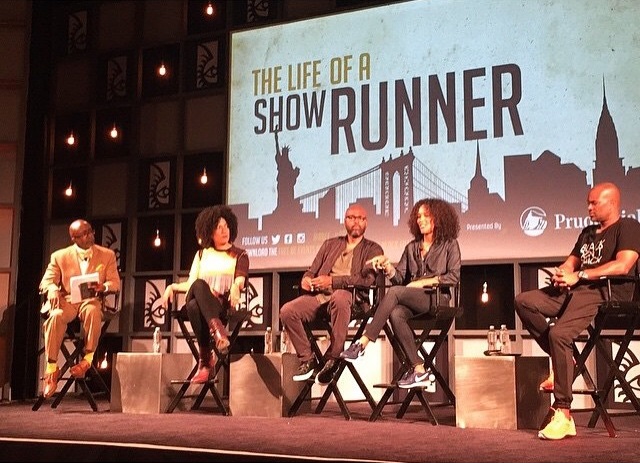For some TV writers, being a staff writer or even a mid-level writer-producer isn’t enough. They don’t want to just write the story; they also want to pick the cast, the wardrobe, the sets, deal with network executives, even decide what the soundtrack is. They want total creative control.
In other words, they want to be a showrunner, like Vince Gilligan of BREAKING BAD or Michelle Ashford of MASTERS OF SEX.

To become a showrunner, a working TV writer has to prove that he or she has the skills to run a show. The showrunner gig is never handed to anyone, even the most talented writers: it has to be earned by working your way up the television writing staff totem pole.
Showrunners Run The Company
Showrunners are the CEOs of shows, which puts them in charge of EVERYTHING, from pre-production through post. As Kevin Plunkett, former VP of current comedy programming for ABC put it:
“The showrunner is managing a $25-million company that goes from zero to $25 million dollars in eight weeks.”
In the writers’ room, the showrunner’s primary responsibilities are hiring and organizing the writing staff, running the writer’s room, and making sure quality scripts are delivered on time. Blame falls on the showrunner if the show fails creatively, so these responsibilities need to be a top priority.
Showrunners also deal with everything else involved in production, like:
- Working with the studio and network on the series’ development
- Selecting and/or approving all department heads
- Consulting with the principal cast
- Approving locations
- Negotiating and approving directors
- Approving sets
Their responsibilities in post-production include things like:
- Approving and hiring editors
- Watching dailies
- Approving cuts
- Approving music
- Working on the publicity and promotional campaigns
For a full list of showrunner responsibilities, click here for Producer’s Guild of America’s expansive list.
Creative Autonomy
The showrunner calls the shots on the groundfloor. Ultimately, though, those decisions trickle up to the network heads, who must approve the television episode before it’s aired. If they feel the episode or show veers from the direction of the series as they envisioned, or sways from the network’s mandate, they’ll send the showrunner notes.
When these notes come early, there’s plenty of time to adapt. But when the notes come late, the showrunner has to scramble at the last minute to incorporate them mid-production and still hit the deadline, which can sometimes undermine the show creatively.

Unless, of course, the showrunner decides he/she isn’t taking notes anymore (and has the power to get away with this without getting fired), as Shonda Rhimes (SCANDAL) admitted to doing when asked about ABC’s notes process by the New York Times:
“I had done GREY’S, I had done PRIVATE PRACTICE. What were they going to do, fire me? I wasn’t worried about what anybody else thought. This one was for me.”
Eventually, the execs at ABC stopped sending Rhimes notes.
Good Showrunners Get Overall Deals
Great showrunners who consistently deliver quality shows, financial success, or both, are usually offered an overall deal, or production overall deal, with studios.
An overall is a guarantee that the studio will pay a certain amount of money over a certain period of time. In exchange, the studios get exclusive rights to any creative material developed or produced in the duration of the deal, which they’ll in turn sell to networks.
In other words, it’s an advance against the showrunner’s success, since they have a proven track record. It’s also the best form of semi-long term job a security a TV writer can get.

A showrunner’s agent negotiates the terms of an overall deal, which can range anywhere from $500,000 to eight figures and typically last 1 to 4 years. Example overall deals include BONES showrunner Hart Hanson’s 2007 overall with 20th Century Fox, which was a 3-year, eight-figure deal, and Seth MacFarlane’s impressive 2008 overall with 20th Century Fox, which was a 4-year overall; because that deal included financial benchmarks for DVD and merchandise sales, MacFarlane netted over $100 million.
When showrunners’ overall deals expire with one studio, they are free to “shop” for a new deal at other studios — that is, if their track record is still solid and they don’t want to “re-up” their old overall deal.
One last note: a production overall deal, or a POD, is essentially the same as an overall deal. The only difference is that PODs are made with a writer’s production company, while overall deals are made with writer and/or producers.
Seth MacFarlane’s production company Fuzzy Door Productions, for example, has an overall deal with 20th Century Fox, and J.J. Abrams’s Bad Robot has a POD with Warner Bros. Television that extends into 2015.
Resources
Next, check out Why Actors Are Switching from Film to TV. This article covers some of the reasons why successful film stars are making the switch to television.
Click here for more essential posts to break into Hollywood. Or learn how you can make the move to Los Angeles.
Questions? Comments are turned off but feel free to message me on Twitter. I’ll respond to everything I can.
###
Photo Credit: Indie Wire

